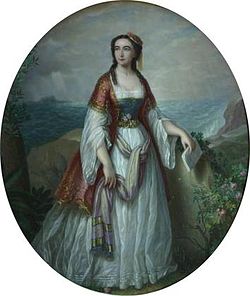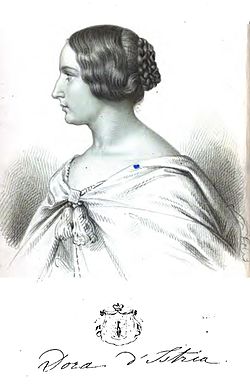- Dora d'Istria
-
Dora d'Istria (January 22, 1828, Bucharest – November 17, 1888, Florence), pen-name of duchess Helena Koltsova-Massalskaya, born Elena Ghica, was a Romanian Romantic writer and feminist.
Contents
Early life
Born in Bucharest as a member of the Ghica family (the daughter of Mihai Ghica and the niece of the reigning Prince Grigore IV Ghica), she received a thorough education, continued abroad—first at Dresden, then at Vienna, Venice and Berlin, where she gave a sample of her mastery of the ancient Greek language to Alexander Von Humboldt.
D'Istria returned to her home country in 1849, married the Russian duke Alexander Koltsov-Massalski, and lived for several years in Russia, mostly in Saint Petersburg, but never cherished the Russian nationalist views of her husband, nor the Eastern Orthodox bigotry at the Court of the despotic Emperor Nicholas. As her health decayed in the Russian climate, she took her husband's advice and headed for Central Europe, first to Switzerland for several years, then to a journey through Greece and Anatolia. Finally, she returned to Italy, living in a villa in Florence, sporadically traveling to France, Ireland and the United States.
As a writer (under the name d'Istria, mostly in French), she was first noticed in 1855. She published a number of works that not only showed her proficiency in Romanian, Italian, German, French, Latin, Ancient and Modern Greek and Russian, but also her knowledge of scientific topics, her liberal views on religious and political topics, as well as talent for presenting her points. Her general stance was cosmopolitan, but she viewed as her main duty to make the sources of Western civilization to the East, and working towards the emancipation of her gender.
She died in Florence.
In culture
Her first work was La vie monastique dans l'Église orientale – "Monastical Life in the Eastern Church" (Brussels 1855; 2.Ed., Paris 1858), where she called for the abolishment of monastic orders. It was followed by La Suisse allemande - "German Switzerland" (Geneva 1856, 4 Vols.; German, 2. Ed., Zürich 1860, 3 Vols.), a description of country and people of Switzerland, with a portion describing a climb up the Mönch.
In the tract Les femmes en Orient - "Women in the Orient" (Zür. 1859, 2 Vols.), she spoke out for the emancipation of women in the Levant; in another, Des femmes, par une femme - "About Women, by a Woman" (2. Ed., Brussels 1869, 2 Vols.), she compared the situation of women in Latin Europe with that in Germany, and demanded with strong words the equal treatment of men and women. Before this volume, the Excursions en Rouméllie et en Morée - "Excursions in Rumelia and Morea" (Zürich 1863, 2 Vols.) were published, where she tried to show that Ancient Greece had the same civilizatory task as the Germany of her time.
She also published the narrative Au bord des lacs helvétiques – "Sailing the Swiss Lakes" (Geneva 1861), the novels Fylétia e Arbenoré prèj Kanekate laoshima (Livorno 1867), Gli Albanesi in Rumenia, a history of the dukes of Ghica - her own family - in the 17th to 19th centuries (2. Ed., Florence 1873), and La poésie des Ottomans (2. Ed., Paris 1877), as well as numerous writings on literary history, poetics, political, social and religious questions, history, art etc. in renown French journals (especially in the Revue des Deux Mondes), the Belgian Libre Recherche, Italian Diritto, Antologia nuova, Rivista europea etc. and Swiss, Greek, Romanian and American journals.
D'Istria was also a painter. She was a member of many scholarly societies, such as the Italian academy; she was also named honorary citizen by the Greek parliament and many Italian cities.
She was also a mountaineer, making an early female ascent of Mont Blanc, on June 1, 1860. As noted, she wrote a description of her climb of Mönch.
The Albanian cause
The family's history and fame, as well as it's putative Albanian origins, are mostly known to the Western readers from Princess Elena Ghica's memories, Gli Albanesi in Rumenia. Storia dei principi Ghika ("The Albanians in Romania. The history of the Ghica Princes").
For Dora d'Istria (Elena Ghica's nom de plume), the crumbly theory of an Albanian origin of the family's founder, resurrected after several centuries of latent existence, proved to be very lucrative: it gave a new sense for her Romantic involvement in the Balkan people's emancipation struggle (having previously adopted - and later abandon - a Hellenophile attitude, by courtesy of her Greek maternal ancestry and under the influence of her Greek tutor Gregorios Pappadopoulos), as well as in her anti-establishment attitude generated by the entrenching of the Hohenzollern in the Romanian Principality to the detriment of her family who had high hopes for a return on the throne.[1]
She started learning Albanian history, and eventually became - since 1866 - the main advocate in Western Europe of the Albanian cause, despite the fact that she never knew or learned the Albanian language.[1]
Her book, Gli Albanesi in Rumenia. Storia dei principi Ghika, which upon its publication in 1873 in Florence caused the wrath of her family, repudiating her[1][2], managed to forever shift the public perception towards the Albanian theory for the origin the family, at the expense of the Aromanian one.[1]
The book was preceded by a series of articles on the nationalities from South-Eastern Europe and their struggle for independence. After articles on the Romanian (1859), Greek (1860) and Serbian (1865) ethnic identity, Dora d'Istria published in 1866 the article entitled The Albanian nationality according to folksongs. The study was translated into Albanian in 1867 by the Italo-Albanian patriot Dhimitër Kamarda[3], and was prefaced by a poem with a revolutionary content, written by an Albanian author and addressed to his countrymen, urging them to rise up against the Ottomans.[4]
Henceforth, Dora d'Istria became known in Albanians nationalist circles which did not hesitate to make use of her name for gaining support for their cause. This situation was accepted and nurtured in her writings (most notably in her correspondence), and she cultivated a relationship with notable Albanian patriots such as Kamarda and Jeronim de Rada.[3] After the publication of Gli Albanesi in Romania..., the Albanian nationalists in Italy proceeded to declare Elena Ghica as the uncrowned queen of Albania.
These speculations were tacitly entertained by Elena Ghica; similarly, other members of the family were drawn into this Albanian nationalistic tradition: at the end of the century, another member of the family, Romanian writer and socialite Albert Ghica would likewise key up vocal demands for the Albanian throne.[1][3]
References
- Antonio D'Alessandri, Il pensiero e l’opera di Dora d’Istria fra Oriente europeo e Italia (Istituto per la storia del Risorgimento italiano, Biblioteca scientifica, Serie II: Memorie, vol. 54), Roma, Gangemi, 2007
- Meyers Konversations-Lexikon. In turn, it cites as references:
- Armand Pommier, Madame la comtesse Dora d'Istria (Brussels 1863)
- Charles Yriarte, Portraits cosmopolites (Paris 1870)
- Bartolomeo Cecchetti, Bibliografia della Principessa Elena Gjika, Dora D’Istria (6. Ed., Florence 1873).
- François Buloz, Revue des deux mondes, 1875. Fragment.
External links
- Liviu Bordas, Dor de Dunăre şi alte nostalgii cosmopolite - Preţul cosmopolitismului in Observator Cultural (in Romanian)
Notes
- ^ a b c d e Liviu Bordaș, Dor de Dunăre şi alte nostalgii cosmopolite - Preţul cosmopolitismului, in Observator Cultural, No. 437, August, 2008.
- ^ Liviu Bordaș, Operele incomplete ale Dorei d’Istria. Istoria unei ediţii la 1870, in Caiete Critice, Bucureşti, nr. 10-11, 2008, pp. 51-56. Online at: Ghyka.net
- ^ a b c Paul Cernovodeanu et al., Elena Ghica - Dora d'Istria. Online at Ghyka.net
- ^ Nathalie Clayer, Origins of Albanian nationalism, Karthala, Paris, 2007, p.209, apud Paul Cernovodeanu et al., Elena Ghica - Dora d'Istria. Online at Ghyka.net
Categories:- Activists of the Rilindja Kombëtare
- Albanian writers
- Feminist writers
- Ghica family
- People from Bucharest
- Romanian essayists
- Romanian feminists
- Romanian mountain climbers
- Romanian travel writers
- Romanian women writers
- Romanian writers in French
- Romanticism
- Russian nobility
- 1828 births
- 1888 deaths
- Russian people of Romanian descent
Wikimedia Foundation. 2010.


